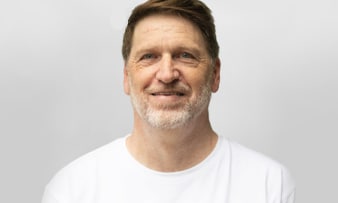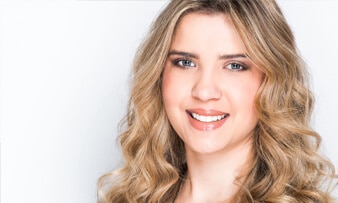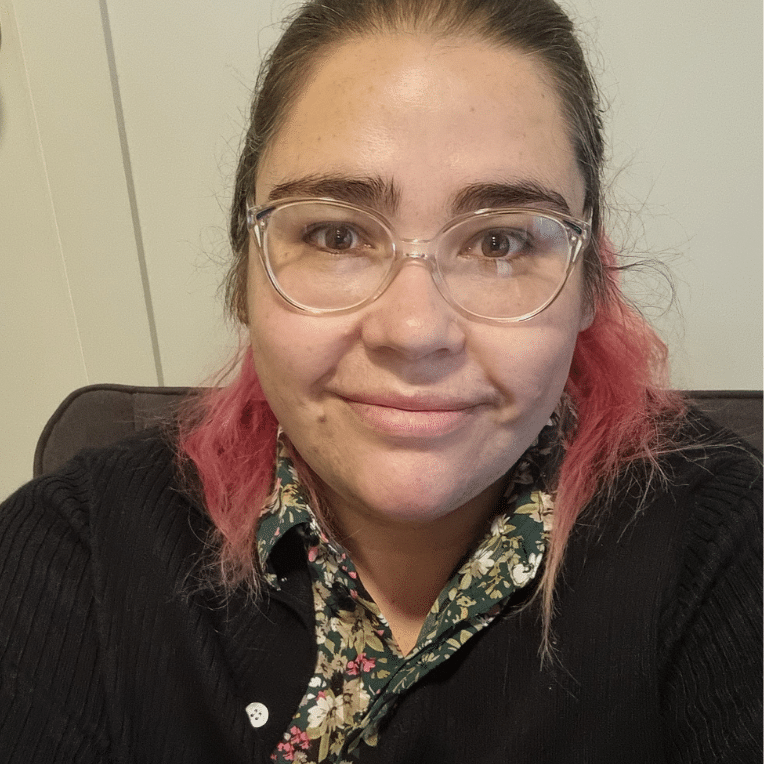Share this episode on
In this episode, we talk with Tim Daly and find out how he came across ‘This is My Brave’ Australia. We also learn why Tim is passionate about breaking the stigma of mental illness and what how sharing stories can be a catalyst for positive change.
Produced by: Black Me Out Productions
Additional reading
View transcript
Growing Bold and fighting mental health stigma with Tim Daly
Pete:
Welcome to the Grow Bold with Disability podcast brought to you by Feros Care. A podcast dedicated to smashing stereotypes and talking about the things people with disability care about most to help us live bolder, healthier, better-connected lives. I’m journalist Pete Timbs.
Tristram:
And I’m Tristram Peters. I work for disability service directory, ClickAbility, and am a wheelchair user living with spinal muscular atrophy.
Pete:
Today’s episode of Grow Bold with Disability is growing bold and fighting mental health stigma. And our guest is Australian Executive Officer of ‘This is my Brave’, Tim Daly. Now ‘This is My Brave’, if you don’t know about them, is a group who are dedicated to breaking the stigma surrounding mental illness one story at a time.
In this episode, we’ll find out a little bit about Tim and just how he came across ‘This is My Brave’. How ‘This is My Brave’ got started and how both are trying to fight the stigma of mental illness. Tim, welcome to Grow Bold with Disability.
Tim:
Thanks Pete, thanks for the invite.
Tristram:
So, Tim before we chat about ‘This is My Brave’ let’s hear a little bit more about yourself. In a previous life you spent nearly 30 years in the entertainment industry. Tell us a little bit about that.
Tim:
Yes, I did. I started out in my twenties as a lonely roadie, lugging PA systems all around Melbourne. That got me interested in entertainment. I ended up doing a bit of theater, a bit of television, a bit of live production and then ended up having to make some money because there’s no money in the entertainment industry. In corporate AV, that’s where all the money is. So, then I spent a good 25 years doing that, working my way up to be a general manager of the local office of an international event staging company here in Australia.
Pete:
As you said, you’re the general manager of this massive events company. During that period, you started suffering acute anxiety and depression. You actually ended up in hospital twice. How did that manifest itself?
Tim:
Yeah, a series of events happened around that particular time with deaths in my family which were unexpected. And then the diagnosis of a severe illness for someone close to me as well. And then running this business at the same time. And me being a bit of a bloke, thought I need to handle all this, so I didn’t look after myself at all-in-one shape or another. I was too busy trying to run a business and looking after everybody and forgetting to grieve about family members.
And it all caught up with me. So, one day my brain basically said “enough Tim go to sleep”
, and I did. I was taken off the hospital, they did all the tests that they could think of, brain scans, heart scans, everything. Couldn’t find anything wrong with me. So finally, off to a psychologist and they diagnosed me with severe anxiety. So much so that I wasn’t allowed to drive a car in case I passed out. I had to give up coffee because the kick from the coffee could just send me over the edge again. And that was a pretty severe six months actually, that I went through that and figured out what it was.
Tristram:
So, what’s your thought process during this? I mean, it’s a massive change in your life that you’re going through during this time.
Tim:
It was having to pair back my life and actually concentrate on the things that were most important. And well, that was taken out of my hands to a certain extent, because the business that I was working for decided I was a liability for the business because of my mental health issue and decided after 16 years of working for that particular business I was no longer needed.
So that just added to the whole thing. But it was also a blessing in disguise because it made me slow down. It made me go “okay you have to rethink what you’re doing here because you’re no good to anybody in this environment in this situation”
. Like I said, it was a blessing in disguise. Took a little bit getting used to but in a good place now.
Pete:
Now you did mention that a loved one was diagnosed and I’m guessing that your partner who lives with M. S. And you became her full time carer. What sort of demands did that put on you physically and mentally obviously?
Tim:
Well like I said it was a bit of an eye opener where having to care for somebody else meant that I have to look after myself at the same time. Because I was no good to her if I couldn’t stand up myself. So that made me focus a lot on my own mental health and physical health because they go hand in hand. To be able to then be able to look after her needs. And again, I’m managing her NDIS so was self-managed. So that’s part of my role in being her carer and being her advocate with medical services. It helped me focus on what she needed and what I need at the same time.
Like I said there was a bit of a silver lining, and the funny thing is that now that I’m home with her most of the time, we’re actually even closer than we were before. It actually worked out really well for us.
Tristram:
Beautiful.
Pete:
Let me just also ask you there, I mentioned a physical and mental strain. What about financially, does that come into it as well?
Tim:
Well see that’s the other thing you have to have to think of, that I was going to go way backwards on salary. So, I had to obviously simplify our lives. But funnily enough it took the stress off.
That worrying about money all the time and simplifying your life actually was a great de stressor for me. In going “okay, I don’t have to worry about that anymore because I don’t actually have the money to do anything. As long as I have enough money for a roof over my head and we’ve got food and we both looked after, I’m happy with that. That was great. So it was actually a de stressor for me.
Tristram:
And on that let’s let’s switch it up ever so slightly, let’s talk about “This is my Brave”
. Can you explain exactly what it is?
Tim:
So, obviously with my background in events and the stigma that I was faced with in the workplace, I decided after everything settled down and I was in a good place again, I found out with my caring role that I had time on my hands. So, I thought what could I do to involve myself more in this side of stigma reduction. So, I looked for a platform that was around mixed events and stigma prevention. And so, as everyone does when they want information, I looked on Google and I found an organization in the U. S. which is called ‘This is My Brave’. And they already had the platform there ready to go.
So, I just rang them up and I said I would love to start this program in Australia. And they said “yes, go for your life”
. They were only in their embryonic stages. They didn’t have a lot to pass on apart from what they called their playbook for their events which was again in its embryonic stage. We sort of had to embellish that for our own situation. So that’s why I started ‘This is My Brave’ and ‘This is My Brave’ is all about as we said breaking stigma. But it’s by the stories of people with lived experience, sharing those stories live on stage as live theatre shows so people can get up and tell the story.
They can do poetry, they can sing, they can dance, they can do comedy. Anyway, that they want to express themselves about their living experience of mental health issues. They’re free to do that. And the best thing about it is they are community members. They’re not professional speakers. So, the story they give us is sometimes raw, funny. You have to bring the tissues along because sometimes they’re really sad about what they’ve been through in their life before. But it’s ultimately uplifting because these people are living productive, fulfilling lives. And managing their mental health. Which is a great lesson for everybody else out there who is facing mental health issues today.
Maybe I can do it too. Maybe I can get through that. So maybe I can actually put my hand up and go and get help and break through that barrier of self and societal stigma.
Pete:
What’s the feedback you’re getting from these people? How is this helping them? Is it sort of like a big therapy about just getting it all out there in front of strangers?
Tim:
It is, but it actually goes over three months, so we do an audition stage and then we pick our cast and then we have a series of rehearsals, monthly or bimonthly. And what happens is the sharing of their stories with a group of people who are sympathetic and understanding of their story and they’re not getting that pushback or that stigma that they may get out there in the community sometimes when they share their stories. So suddenly they can spread their wings and go this is my story, you’re not going to stigmatize me about it, so I feel free. I feel fantastic. And by the time they get to the show they are a really tight group of people who support each other, and you can tell by the confidence that they actually end up having, getting up on stage in front of a group of people and sharing their lived experience. And then getting applause at the end of it because that’s unknown. Absolutely unknown for people who are going out and sharing their story.
Tristram:
The end result shows that it’s all so, so worth it. But I mean, I couldn’t think of anything worse than getting up on stage and and sharing my story, especially to strangers. And I suppose this is why it’s called ‘This Is My Brave’. But where do people find the courage? How do you convince people that this is the avenue for them?
Tim:
Well, we don’t put any pressure on. They can jump out at any time they like. Any time if they don’t feel comfortable with the process, we just say that’s fine, we understand. Not everybody is at the stage where they’re willing to share, but some of them use it as a catalyst to move on to other things in their lives. To say, if I can get up in front of a group of strangers and share my story and it works out okay, then they go, okay, that’s a catalyst.
What else can I do after that? And that’s the reason it’s called ‘This is My Brave’, is that there is a level of courage that goes into it. Look, the feedback we get from some of the cast members are, I’m not embellishing this, they said “this saved my life. I was going down the path of suicide, suicidal ideation, but this sort of brought me back a bit”
.
And another person said, “look, this is the first time that I’ve actually looked at my own issues”
. And she was a mother of three or four children, and she said, “I finally put my hand up to go out and get help”
. And that happens within the cast, and it actually happens within the audience as well. The post show chats are just as informing and enlightening as the show itself sometimes.
Pete:
Yeah, I was going to ask you, do you find a lot of people actually go along as audience members then sign up for ‘This is My Brave’?
Tim:
Not usually audience members. We get interest in that but not usually audience members. Because part of the show is that we also invite, depending on where we go. Our last show was in Bathurst. We invite all the local mental health services to set up a stall at the back of the room. So, if anybody wants to talk about mental health, there will be, and I think we had 12 mental health services in the back of the room, that they could just get up out of the audience and go and talk to them directly and go “I know somebody, someone in my family or myself or whatever”
and get that information straight away.
So, we’re a bit of a a conduit between the community and the community services during that event. And there’s also the fact that as you touched on this is a bit of a global movement, this is happening not just in Australia, as you said. How does it feel to be part of that sort of global movement? That it is not just in Australia where we’re changing these thoughts about the stigma, we are doing it all over the world?
Tim:
You know, it’s great because storytelling is vital to all parts of our lives, not just for mental health. Mental health is tied up in all that, isn’t it? It is building community, feeling connected and storytelling is the basis of all that.
And we can give people a safe place to come and share their stories. Then we’re going a long way towards building community. Building safe spaces for storytelling and people sharing about all parts of their life, whether it’s disability, whether it’s mental health, whether it’s anything, maybe just socioeconomic disadvantage of getting the people who feel isolated from society back in again.
Pete:
Yeah, it gets back to the roots really, doesn’t it? And I guess that’s probably why it’s becoming sort of more and more popular. Are you finding a lot of people knocking on your door wanting to be part of it?
Tim:
Yeah. When we announce it, I always get people out of the blue going I want to tell my story. I want to be part of it. So, we don’t ever have a problem getting a cast. As soon as they find out about it and they know about it, they go, oh yes, that’s what I’m looking for. Because the other part of having mental health issues is sometimes you feel like you’re not being heard. You’ll go to the doctor, you’ll go to the GP, you’ll go to the psychologist, and they are all wonderful. But they’ve got time constraints as well. So, you never actually get your full story out and you go at the end of the 15 minutes, at the end of the hour, I’ll talk to you next time. But during our show and during the three months, they’ve got time to explore their story and put it into some sort of order that fits their story. And they feel very confident by telling their story. Which means that they can go on and tell the story to other people and be confident about getting the message across as well.
Pete:
Is there a great camaraderie there as well? Because like-minded people, or just better listeners maybe?
Tim:
Oh, definitely.
They understand. That’s the best part about it. But I started doing these shows in 2017, and I’m still in contact and talking to the people who did our first show in 2017. So, there’s a real connection there and we’re able to lean on each other at certain times, so, which is great. So, people don’t feel like they’re alone anymore in what they’re going through. That’s really good for me. It’s good, it’s helped with my mental health, being able to support and help other people and feeling that sense of community with them.
Tristram:
And I mean we’ve touched on it, but in terms of encouraging people to become part of this, if you if you were speaking to them directly, how would you sort of do the elevator pitch? How would you convince someone that this is such a beautiful process?
Tim:
Usually, we encourage people who have been through it and probably not going through it at the moment, through mental health issues, because like you said, getting up in front of people, a live audience is anxiety ridden. And we don’t want to add to their anxiety in any way or shape. So, we say to people, if you’re sort of not in a good place in your recovery, it’s probably not a good place to be. If you’ve gone through the recovery and you’re feeling comfortable and safe and ready to share your story, then this is a great place to do it and to build some community and get across to the rest of your community that living with mental illness is not the end of your life, it’s just something you manage and you move on.
Pete:
Now. We’ve mentioned the word a couple of times, stigma. Where does that come from? Is it a part of Australian society, of our era, of our generations growing up and maybe that’s going away? Where do you see that stigma coming from?
Tim:
Well, it’s just a lack of education. And it is also media. Media contributes to it by sensationalizing stories that have to do with people with mental health issues being violent, which is terrible. So, people get that in their heads, that you’ve got a mental health issue, you must be violent, there must be something wrong with you and I’m scared of you. A lot of it comes from that. And movies as well. They portray people with mental health issues as the baddie all the time. So, there’s that perpetuation of that stereotype of people with mental health. But the figures show that people with mental health, the percentage who are violent is just the same as the rest of the populations.
Pete:
So, what’s the solution to get rid of this stigma? Is education of the next generation and our generation, of course, but what do you see as the…
Tim:
Definitely education. So, this is what we base ours on. People need to look at people with mental health issues as a peer not as their diagnosis. So, you don’t look at someone and say, “you’re bipolar”
, you say “you’re a mother or a father or a student or a daughter or a son who deals with bipolar”
. We’ve gonna flip that around. That we look at them first as a person and then look at their diagnosis.
Because if you’re constantly told, “you’re bipolar, you’re bipolar, you’re bipolar”
, unfortunately you’ll probably end up believing it. And that’s what the focus of your life will be. I’m mentally ill, I’m mentally ill. But you are not, you know. That’s just part of your life. It’s not your whole life.
Pete:
Yeah, so true.
Tristram:
In terms of “This is My Brave’ what’s next? Is it just going to be theater or is there room for expansion? Are we going to hear these stories in other mediums? What’s the next step for it?
Tim:
Definitely.
So, we started out a couple of years ago, it started out as the Canberra Mental Health Film Festival. So, it’s just another way of telling stories, isn’t it? And it’s a popular medium in film. So, getting the anti-stigma message across is really good through film. But we are in our fourth year this year and we’ve actually expanded out to the U. S. and the U. K. So, it will now be the ‘This is My Brave” international Mental Health Film Festival. And we just opened up for submissions for this year’s festival which will happen fortuitously on World Mental Health Day on 10 October.
Pete:
So, how do people get involved?
Tim:
Go to our website, which is www.thisismybraveaustralia.com.
And all the information for the film festivals and everything else we do is on that page.
Pete:
And Tim if I’m living in far North Queensland or I’m down in Victoria or I’m over in Perth, is it accessible for me as well or do I have to come from Canberra? You said you did a show in Bathurst.
Tim:
We’ll go anywhere. We’ve already done shows in Perth, all over New South Wales, obviously in the ACT, but we’ll go anywhere. We’ll look for a volunteer producer in that location and off we go. So, I’d love to be able to do more shows around the country because once people are involved in them, they go, wow, that was a really positive experience. And especially with the rest of the community and neighbors and people you work, it changes, their mind about mental illness.
Tristram:
Absolutely, sounds great. So, Tim as you know, this podcast is called Grow Bold with Disability and we always like to ask our guests what does living a bold life mean to you?
Tim:
A bold life means to me, and it’s probably something that I had to really focus on, is that don’t let them knock you down and stay down.
If you get knocked down, get back up again and know that you’re fighting the good fight and you’re doing the right thing. Don’t let anybody else tell you that you’re not.
Pete:
It’s a good, good message for everyone. Now our listeners can find out more about tim and ‘This is My Brave’ in the links provided in today’s episode show notes and of course on www.thisis mybraveaustralia.com. Tim, thanks so much for joining us here today on Grow Bold with Disability podcast brought to you by Feros Care. That’s been amazing.
Tim:
Thanks guys. Thank you very much for the invite.
This podcast is brought to you by Feros Care, an NDIS partner delivering local area coordination services in Queensland, South Australia and the Australian Capital Territory. Feros Care is a people care organization committed to helping people live bolder lives. We call it Growing Bold. For over 30 years, Feros has been making it real for both older Australians and those living with disability. To find out more head to www.feroscare.com.au
View podcast disclaimer
The content and views discussed in this podcast series are those of the individuals involved. They are not necessarily condoned by, or, are the views of Feros Care or its employees.
Our Guest






